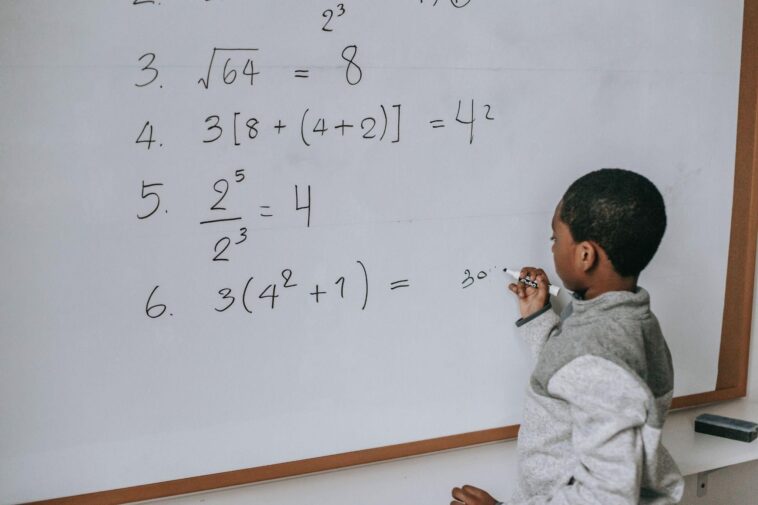Math is a daunting subject, and kids may easily lose interest in it, especially because of all the negative comments about how hard math is. From a young age, when children can nurture their interest in math, they can dislike the subject after hearing about bad experiences when learning math or showing bad performance.
Hence, it is essential to work on making math fun for child and help them love learning it without being affected by the negative thoughts. Math plays a vital role in the future career path your child decides to take as well as their general development in STEM. Below are some ways on how to make math fun for kids.
1. Avoid talking negatively about math

Some parents assume that telling their kids about how they struggled with math in school would make them feel at ease. It is the opposite as some kids feel more discouraged as they think if their parents can’t do it, how can they? Avoid communicating your lousy attitude about math to your kids. Math for 8th graders can be rather tricky, so it’s best to avoid negative remarks and let your kids have their own experience in learning math.
Rather than focusing on the result, focus on the procedures used to arrive at the end answer. Most of the time, you might realize that your kids followed the correct procedure but messed up a number or two. This shows that the answer’s correctness does not determine a child’s knowledge of math; instead, it is understanding of the process that is important.
2. Incorporate modern learning methods
As the world continues to rely on technology, teachers and parents should also find new ways to teach their learners using technology. Technology plays a significant role in how 21st-century students are taught. Learning has been made accessible through fun math apps, YouTube videos, and virtual reality. Through math apps, kids can learn at their own pace without feeling pressured to keep up with the curriculum. Math apps also offer fun math puzzles that incorporate skill-building challenges.
YouTube videos make it easy for kids to rewatch a particular concept until they gain a deeper and richer understanding. They can use videos for future reference to remind themselves of what they learned. In a formal class setting, kids can’t refer to the teacher’s explanations of the previous lessons.
3. Show math’s practical application

Generally, most daily activities, like shopping, cooking, or setting the table, involve math. Let your kids engage in such activities and give them challenges to complete. While you are out shopping, let them calculate the discount offered on a particular product. When you cook, let them keep you company and give them simple instructions that involve counting, like “pass me five eggs or four tomatoes”.
Compared to tasks in a textbook, challenges in the most mundane activities are more fun and engaging. Try giving money for a week to your kids and let them calculate the expenses and the balance every day. Other than learning addition and subtraction, your kids will gain skills in managing money which will be essential in the future.
4. Avoid over-criticism

Many parents have developed a habit of criticizing their kids for failing. Some even go ahead, stroke their kids and compare their performance with the performance of peers. As a parent, you must understand that only some answers are correct in math. Do not judge your kids’ performance compared to that of other kids. Each child has their own learning pace and ability. Understand where your child is having difficulties and find ways to help them improve.
Remember how you felt discouraged when your parents criticized your performance like your kids think when you criticize. Criticism is good, but let it be constructive criticism that will encourage your kids to work harder to improve. If you criticize your kids for failing, ensure that you appreciate and reward them when they perform well.
5. Hire a reliable math tutor

You have probably heard kids talk about their lousy math teacher or how they hate math because of their teacher. A math tutor plays a significant role in enhancing kids’ interest in learning math. A good tutor should be able to cooperate with your kids and be supportive by encouraging them to learn and solve tasks even after failing on the first trial.
If you cannot find a reliable math tutor, you can decide to tutor your child and explain different math concepts enthusiastically to them. Working together on math problems will allow them to express themselves and ask questions if they do not understand. And a reliable tutor will ensure your kids are always eager to learn.
6. Always hold fun and interactive math classes

How does it feel to sit for two hours in a classroom where the teacher speaks continuously, even without asking hypothetical questions or involving the learners completely? Such sessions are so tiring and boring that some doze off between lectures. While holding math classes, you should avoid such sessions and allow students to get involved in the session.
Some tutors even set aside classes to be student-led sessions where kids can teach their peers a particular concept. An interactive class allows learners to ask burning questions which enhances a learner’s concentration and knowledge retention.
Conclusion
When it comes to math, it is easy for a learner to lose interest in learning. Negative peer pressure also affects a learner’s interest in math so that even for a bright student, it is easy to be swayed away by the need to fit in with a particular group of people. Besides making math relevant and meaningful, parents should also be interested in understanding what makes kids lack interest in math.



